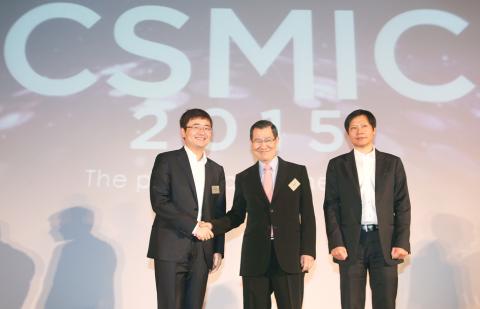Cheetah Mobile Inc (獵豹移動), a Chinese mobile tools application developer, yesterday said it plans to set up a NT$100 million (US$3.13 million) program to fund Taiwanese startups in the mobile Internet business.
“Taiwan almost missed the Internet era, and it is now time for Taiwan to deploy and integrate more resources to catch the tail end of the mobile Internet era,” Cheetah Mobile chief executive Fu Sheng (傅盛) told a cross-strait Mobile Internet Conference in Taipei.
Fu said the program would welcome business ideas that might become a market trend in three to five years, adding that these startups would stand a better chance of forming strategic partnerships with Cheetah Mobile or even Xiaomi Corp (小米) compared with other companies.

Photo: CNA
“We are eager to seek talent and new business opportunities. We hope the fund will break geographical barriers and create win-win opportunities for Taiwanese startups and us,” Fu said.
He said he expects the program to commence this quarter, adding that the company is considering hosting an open audition to screen business proposals.
Fu said the program aims to mentor rather than just provide money to help young Taiwanese establish their own businesses.
Providing funding does not mean Cheetah Mobile will control the companies, he said.
“It will be an investment, not a merger and acquisition,” Fu said, adding that he would personally help mentor Taiwanese startups.
Cheetah has no plans to set up similar programs in Southeast Asian countries, as Taiwan, given its language and cultural proximity, serves as an important gateway for Chinese enterprises to access the global market.
Xiaomi founder and chief executive officer Lei Jun (雷軍), who is also a cofounder of Cheetah Mobile, agreed, saying that Taiwanese who wish to establish their own businesses should focus on mobile Internet and smart home devices.
“Many of my Taiwanese friends have complained that they are constrained by Taiwan’s rather limited market, but if you launch a mobile application on Google Play or Apple Store, you have the global market,” Lei said.
When Cheetah Mobile was established a few years ago, there were only three to four people writing mobile apps, Lei said.
As of this month, the company’s Clean Master application has 340 million active users around the world, he said.
Lei said he foresees smart home devices that link to personal handheld devices via cloud computing will be the major market trend in the next five years, adding that Xiaomi is also working on this sector.
“To be honest, I have not seen many Taiwanese manufacturers working on this business opportunity,” Lei said.
In response to Fu’s remarks, the Investment Commission said Cheetah Mobile could fund its NT$100 million through a Taiwan-based venture capital company in accordance with Taiwanese regulations on Chinese investments.
“Plus, Cheetah Mobile can only control 49 percent at most of the venture capital’s operation,” Investment Commission Acting Executive Secretary Emile Chang (張銘斌) said by telephone.

Vincent Wei led fellow Singaporean farmers around an empty Malaysian plot, laying out plans for a greenhouse and rows of leafy vegetables. What he pitched was not just space for crops, but a lifeline for growers struggling to make ends meet in a city-state with high prices and little vacant land. The future agriculture hub is part of a joint special economic zone launched last year by the two neighbors, expected to cost US$123 million and produce 10,000 tonnes of fresh produce annually. It is attracting Singaporean farmers with promises of cheaper land, labor and energy just over the border.

US actor Matthew McConaughey has filed recordings of his image and voice with US patent authorities to protect them from unauthorized usage by artificial intelligence (AI) platforms, a representative said earlier this week. Several video clips and audio recordings were registered by the commercial arm of the Just Keep Livin’ Foundation, a non-profit created by the Oscar-winning actor and his wife, Camila, according to the US Patent and Trademark Office database. Many artists are increasingly concerned about the uncontrolled use of their image via generative AI since the rollout of ChatGPT and other AI-powered tools. Several US states have adopted

A proposed billionaires’ tax in California has ignited a political uproar in Silicon Valley, with tech titans threatening to leave the state while California Governor Gavin Newsom of the Democratic Party maneuvers to defeat a levy that he fears would lead to an exodus of wealth. A technology mecca, California has more billionaires than any other US state — a few hundred, by some estimates. About half its personal income tax revenue, a financial backbone in the nearly US$350 billion budget, comes from the top 1 percent of earners. A large healthcare union is attempting to place a proposal before

KEEPING UP: The acquisition of a cleanroom in Taiwan would enable Micron to increase production in a market where demand continues to outpace supply, a Micron official said Micron Technology Inc has signed a letter of intent to buy a fabrication site in Taiwan from Powerchip Semiconductor Manufacturing Corp (力積電) for US$1.8 billion to expand its production of memory chips. Micron would take control of the P5 site in Miaoli County’s Tongluo Township (銅鑼) and plans to ramp up DRAM production in phases after the transaction closes in the second quarter, the company said in a statement on Saturday. The acquisition includes an existing 12 inch fab cleanroom of 27,871m2 and would further position Micron to address growing global demand for memory solutions, the company said. Micron expects the transaction to